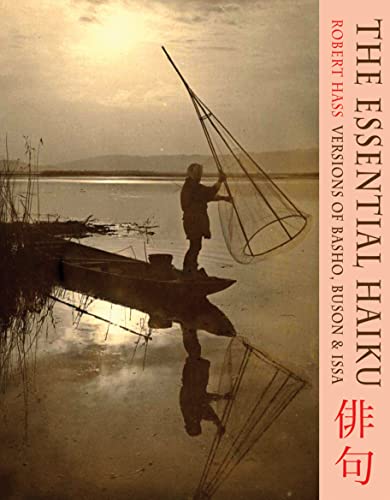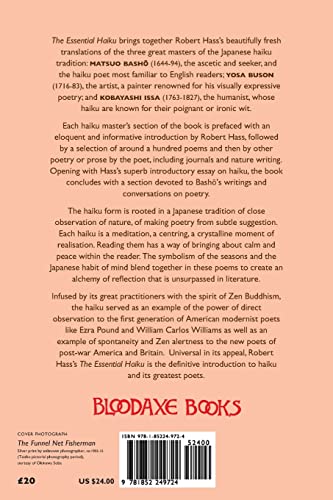


The Essential Haiku: versions of Basho, Buson and Issa
M**E
An excellent introduction to three preeminent haiku poets.
In this book, Robert Hass provides translations of haiku by three of its preeminent practitioners, together with supplemental material to give the reader context, such as how haiku grew out of the older Japanese tradition of collaborative verse. Basho, who lived in the seventeenth century, worked before haiku were seen as an independent art-form.At the end of the book, Hass discusses the difficulties of translating haiku. How the resonance of their seasonal references, their mix of kanji and phonetic symbols, the syntax, the punning are hard to render in English. Yet despite that, he captures something that moved me in his lean translations. For example, here are two of his translations of Basho: Midfield,attached to nothing, the skylark singing. You could turn this way,I'm also lonely this autumn evening.And two of Buson's: Coolness--the sound of the bell as it leaves the bell. The old mancutting barley-- bent like a sickle.And two of Issa's: The holes in the wallplay the flute this autumn evening. Last time, I think,I'll brush the flies from my father's face.I found the book an excellent introduction to the three poets. Highly recommended.
C**F
The Essential Haiku is a lovely collection of poetry
I love this little book! These are the Japanese masters: Basho, Buson, and Issa. A lovely introduction to haiku and other short form Japanese poetry by masters of the form translated and edited with great care by Robert Hass. Something is lost in translation; however, the ideas are still faithfully portrayed. Very well worth reading. Wonderful for readers as well as poets who may want to try this complex little form. I leave this book feeling serene and uplifted.
A**O
"Learn about pines from the pine."
Hass presents a comprehensive introduction to the works of Basho, Buson, and Issa. The translations are quite readable and the commentaries are excellent. It seems to me one who seeks to understand haiku should begin with the old masters.This work was published in 1994, giving modern English haiku folks twenty years to argue about what is going on with haiku.In the meantime, the old masters who began it all are here waiting. Whatever I read of modern haiku I intersperse with one or another versions of the masters. That gives me perspective with which to evaluate theory and practice of today.At the price of a used book today, this is an incredible bargain. You will want other versions, but this is an excellent beginning.If you wish to delve deeply, this book includes how to and commentary by the old poets themselves. It is well worth knowing what they said. "Learn about pines from the pine, and about bamboo from the bamboo."
A**Y
Classic Haiku
I checked this book out from the library, and liked it so much that I decided I should own it. I realized I had never before encountered the seminal classic haiku, or much of any haiku composed in Japanese rather than English. These are stunning poems, especially the final poet (Issa), whose sense of humor and voice in general were really what motivated me to make the purchase.
D**S
A Variety of Haiku by Famous Japanese Poets
Americans and others are writing minimal syllable poetry in their own native languages. Getting familiar with the source is a significant part of the process of finding your own poetic stance. This book is a good start.
Trustpilot
2 days ago
1 month ago